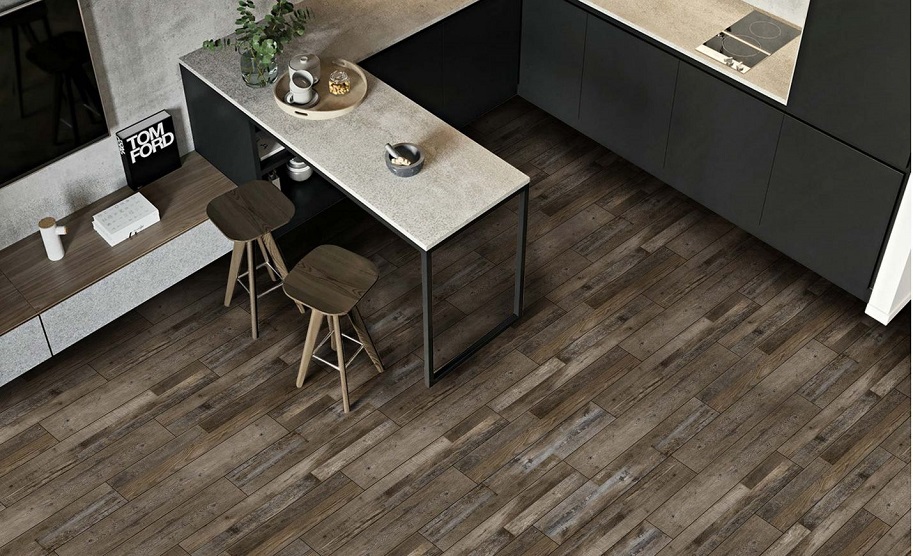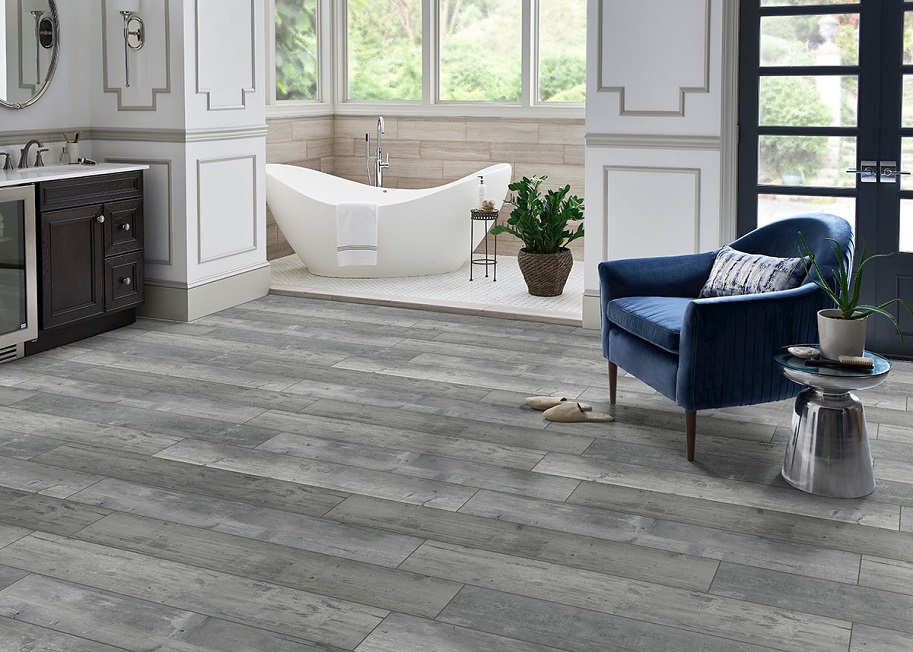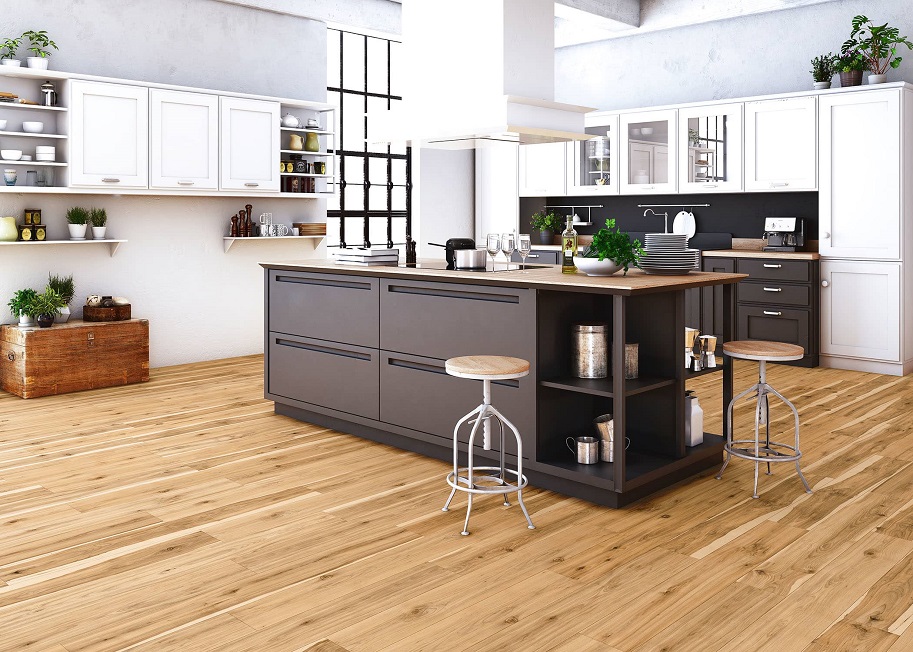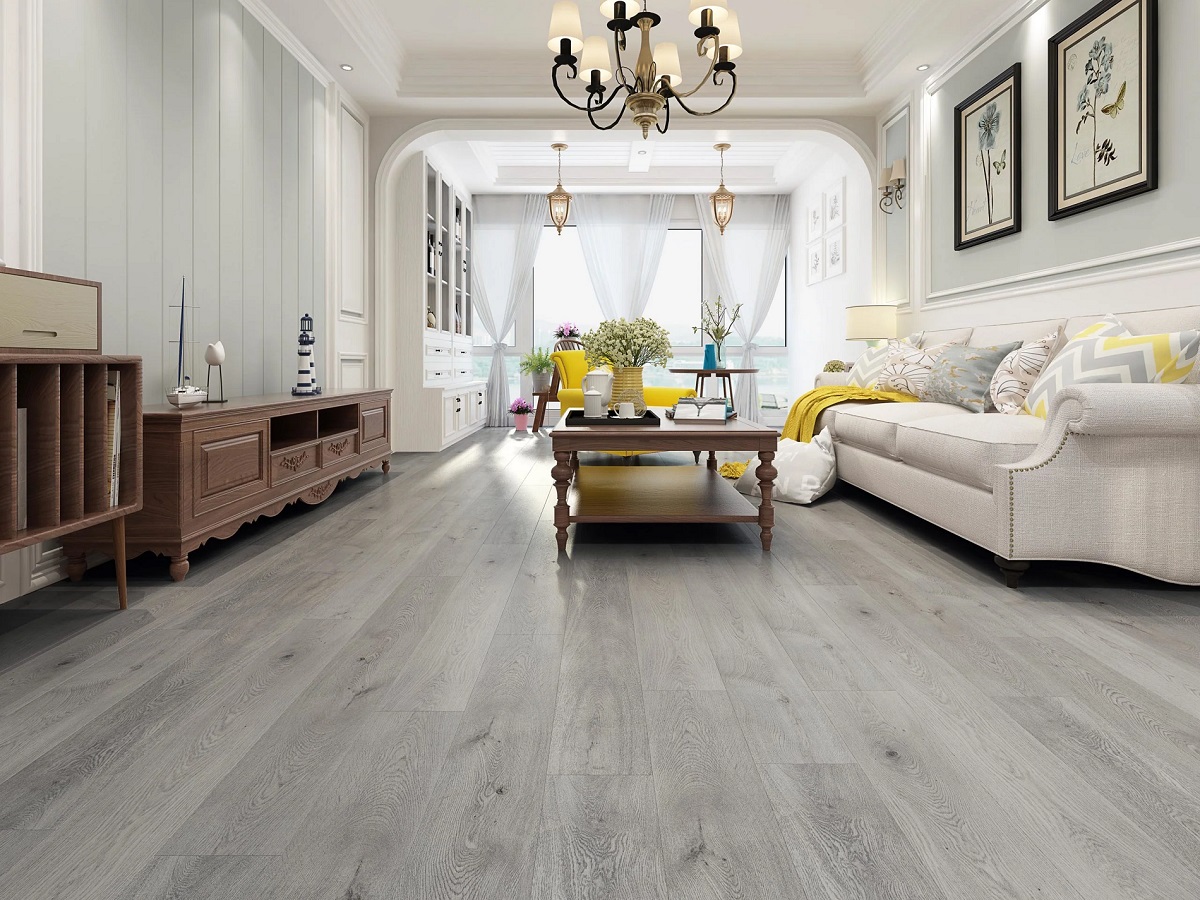Hardwood flooring is undoubtedly very appealing for both residential and commercial spaces. It gives warmth and aesthetics, creating a pleasant atmosphere. However, there are many instances when you can benefit more from a different material and still have the effect of timber.
The increasingly popular vinyl flooring is a synthetic material that replicates the look of wood. It comes in various patterns and colours, designed to mimic different types of wood. The top layer is a printed image of wood grain, covered by a wear layer for durability. High-quality luxury vinyl tiles or planks, also known as LVT, LVP, or vinyl sheets, not only closely resemble natural wood, but have many other advantages that make this alternative quite popular.
If you are in two minds about what type of flooring is better for your home and needs, we will go through a few factors that can influence your choice and compare the timber flooring and vinyl timber look flooring. Both types of flooring have their own advantages and disadvantages when it comes to durability, maintenance, installation, price, and overall comfort.
What Is Vinyl Timber Flooring?

Vinyl flooring is a synthetic material made primarily from polyvinyl chloride (PVC) layers and other additives, bonded together and covered with a design layer. It can vary in thickness, and you can find it in the form of sheets, vinyl composite tiles, or luxury vinyl planks. The long planks look very similar to hardwood boards, and along with the textured surface and grain patterns, they give the vinyl timber look flooring an attractive wood-like appearance.
Which Flooring Is More Durable?
Vinyl wood flooring is known for its excellent durability, in fact, manufacturers warrant vinyl for 20 to 25 years. Its resistance to moisture makes it ideal for bathrooms and laundry rooms, as well as kitchen floors. The top wear layer is resilient to scratches and dents, so it’s suitable for high-traffic areas like hallways and living rooms. Vinyl planks are more resistant to stains than natural wood and are therefore the perfect solution if you have young children and pets.
Hardwood flooring is also durable, especially well-processed wood boards that are properly finished and well-maintained. However, it is susceptible to scratches, especially from pet claws and heavy furniture. Wood is also easily damaged by moisture if not properly sealed, so it’s not the best option for moisture-prone areas.
Installation
Wood vinyl flooring is often available in click-and-lock or peel-and-stick formats, making it a popular choice for DIY projects. It can be placed directly over existing floors in some cases, even when they have minor irregularities.
Installing hardwood floors typically requires professional expertise, as it involves nailing or glueing individual planks to a subfloor. The wood needs to be finished and sealed properly so that water or debris won’t get between the boards and cause swelling and damage to the wood. In short, it’s not a job you should do yourself if you don’t have the necessary skills, as mistakes can be frustrating and expensive.
Maintenance

Vinyl is one of the easiest types of floors to maintain. Regular sweeping and occasional mopping with a damp cloth are usually enough, although you can also use manufacturer-recommended cleaners. Spills are easy to clean, and the protective wear layer helps resist stains. In cases of cuts or other damage, a single plank or sheet can be removed and replaced with a new one.
Hardwood floors need more maintenance. Regular sweeping is necessary to prevent dirt and debris from scratching the surface. It is usually recommended to use pads on the feet of the furniture to avoid deep scratches. Don’t let water sit for longer periods, and use only wood-friendly cleaners. Periodic refinishing will upkeep the appearance of the timber floors, repair some damages, or restore the wood’s natural beauty.
Price
All the vinyl options are less expensive compared to natural wood. You can compare prices between the varieties of vinyl and choose the best options for your budget. Usually sheet vinyl is cheaper than tile, and luxury vinyl tiles have the highest prices, but with wood-effect vinyl flooring, the prices won’t differ much if you opt for a common or more exotic type of wood design.
Timber floors cost significantly more. Generally, the prices go up the harder the wood is, as this means higher quality. If you choose exotic wood, expect to pay more. How much the wood flooring will cost depends on the wood’s species, grade, cut, and finishing treatments. You should also consider the labour expenses for installation.
Comfort and Noise
Since it’s soft underfoot, vinyl is quite comfortable for walking on. It offers some degree of sound insulation, reducing noise transmission. Additionally, a layer of padding installed underneath will improve the insulation properties of the flooring and increase the energy-efficiency.
Wood provides a classic, warm feel and can also help with insulation, but it can be noisier and produce creaks and footsteps.
Environmental Considerations
Some vinyl products may contain chemicals that could be harmful to the environment and indoor air quality. However, eco-friendly options with low VOCs (Volatile Organic Compounds) emissions are available on the market today.
Hardwood is a natural and renewable resource, making it a more environmentally friendly option. You can find certified sustainable wood sources for eco-conscious choices.
To Sum Up

Vinyl flooring offers an attractive and affordable alternative to real hardwood with numerous benefits such as durability, water resistance, easy installation, and low maintenance. It provides the warmth and elegance of wood while being suitable for a wider range of applications.
However, real wood can also last for generations if it is well-maintained and offers an undeniably beautiful natural look. Ultimately, the choice between vinyl timber and actual timber flooring depends on your budget, lifestyle, aesthetic preferences, and environmental concerns. Both have their merits, so weigh the factors that matter most to you before making a decision.
